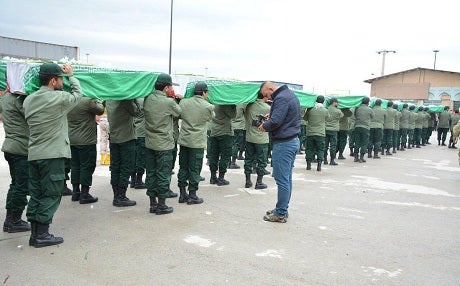ERBIL, Kurdistan Region – Iraq and Iran exchanged the remains of soldiers killed during the eight-year long conflict between their nations that killed more than one million people.
“Iraqi and Iranian authorities exchanged today the mortal remains of 46 Iranian and 4 Iraqi soldiers killed in the 1980-88 war between the two countries,” stated the International Committee of the Red Cross (ICRC) in Iraq that oversaw the transfer.
The two sides have made several similar exchanges over the years, but this is the first to take place in Iraq’s Wasit province.
Iranian officials welcomed the return of their soldiers with a ceremony in Ilam, Tasnim News reported.

The bodies will be transferred to Tehran, according to IRNA.
Saddam Hussein launched a war on Iraq’s neighbour, hoping for an easy victory over an Iran just after the Islamic revolution.
The conflict became a savage war of attrition that raged for eight years and is still taking casualties from the Kurds who live on the mountainsides along the border littered with hundreds of thousands of landmines.
“Iraqi and Iranian authorities exchanged today the mortal remains of 46 Iranian and 4 Iraqi soldiers killed in the 1980-88 war between the two countries,” stated the International Committee of the Red Cross (ICRC) in Iraq that oversaw the transfer.
The two sides have made several similar exchanges over the years, but this is the first to take place in Iraq’s Wasit province.
Iranian officials welcomed the return of their soldiers with a ceremony in Ilam, Tasnim News reported.

The bodies will be transferred to Tehran, according to IRNA.
Saddam Hussein launched a war on Iraq’s neighbour, hoping for an easy victory over an Iran just after the Islamic revolution.
The conflict became a savage war of attrition that raged for eight years and is still taking casualties from the Kurds who live on the mountainsides along the border littered with hundreds of thousands of landmines.




Comments
Rudaw moderates all comments submitted on our website. We welcome comments which are relevant to the article and encourage further discussion about the issues that matter to you. We also welcome constructive criticism about Rudaw.
To be approved for publication, however, your comments must meet our community guidelines.
We will not tolerate the following: profanity, threats, personal attacks, vulgarity, abuse (such as sexism, racism, homophobia or xenophobia), or commercial or personal promotion.
Comments that do not meet our guidelines will be rejected. Comments are not edited – they are either approved or rejected.
Post a comment